Facing the most dire budget outlook in its modern history, the City of Portland is considering a new fee they hope will spare them financial calamity and a dramatic reduction in services.
This week the bureau revealed what it’s calling a “transportation utility fee” (TUF). The new fee, which PBOT Communications Director Hannah Schafer described in a phone call with BikePortland as a “temperature read” at its very early stages, could raise between $29 million and $54 million a year.
Under the initial proposal (which was revealed to key stakeholders at The Street Trust and Portland Business Alliance this week) Portland residents would be charged a monthly fee — $8 for single family residential, $5.60 for multifamily residential units — on a utility bill similar to what folks currently get for water or other city services. Businesses would also be charged a flat fee depending on their size. The minimum business fee would be $8 a month, small and medium restaurants and retail shops would be charged $15 or $30 a month respectively. And the fee would be capped at $200 for the largest businesses.
This type of fee is used by over 30 other cities in Oregon and it ranked well in a recent report from Metro (see below).
Here’s the key slide from a presentation PBOT is shopping around:
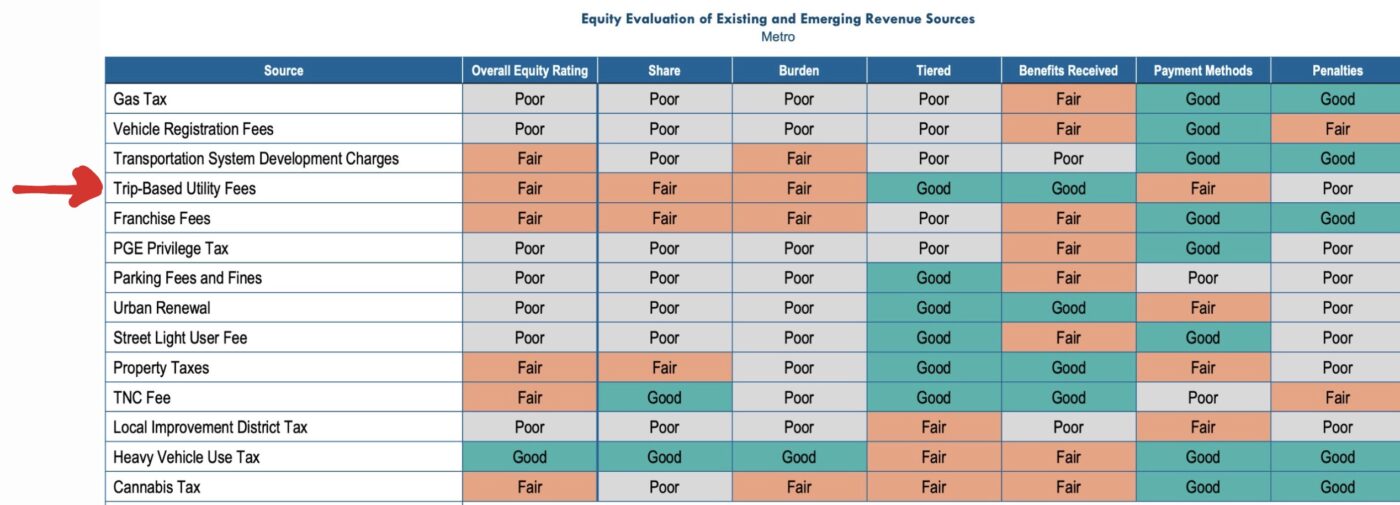
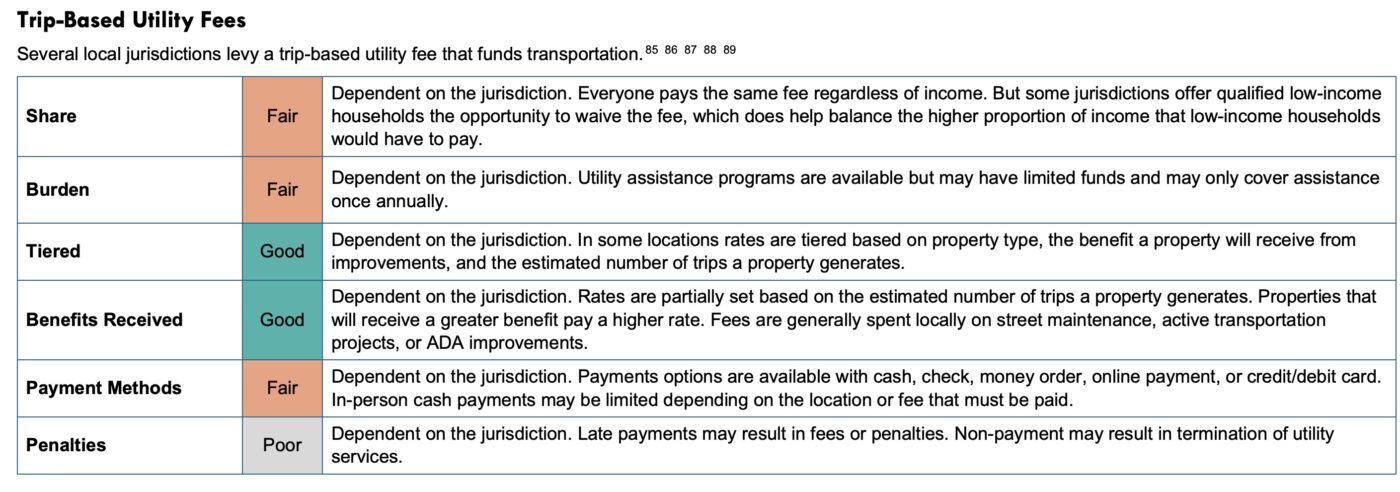
PBOT has already been pretty far down the road of a proposal like this. In 2014 the city backed a “transportation users fee” (same acronym as the current one) that would have charged a similar amount. That plan was scrapped after facing strong opposition and was replaced with an income-based tax. That idea didn’t last long either and PBOT backed away from it when they heard from legislators who feared it might hurt their ability to raise statewide transportation taxes in what became the massive House Bill 2017 funding package. The eventually settled on a 10-cent local gas tax increase that was approved by voters in 2016 and then again in 2020.
PBOT says they must do something to address a $60 million revenue shortfall they face over the next five years. The agency has reduced spending on programs, projects, and staff for many years as the gas tax and our share of the state highway fund have gone down while inflation has gone up. The steep reduction in parking meter revenue due to the pandemic has been just the latest nail pounded into the coffin. And recently PBOT has been hit with new, homelessness-related expenses. PBOT currently spends about $4.3 million a year on their derelict RV program and addressing encampments. So far this fiscal year, PBOT has taken 651 RVs off the street at a cost of about $3,000 each ($1.95 million total).
PBOT Commissioner Mingus Mapps and his staff have brought up this line-item several times recently. “We’re kind of roads and bike lane people,” Mapps said at a City Council budget work session in March. “We’ll step out and help the city get better and heal in any way we can. But this city’s dynamic needs, really are placing this particular bureau in a delicate space.”
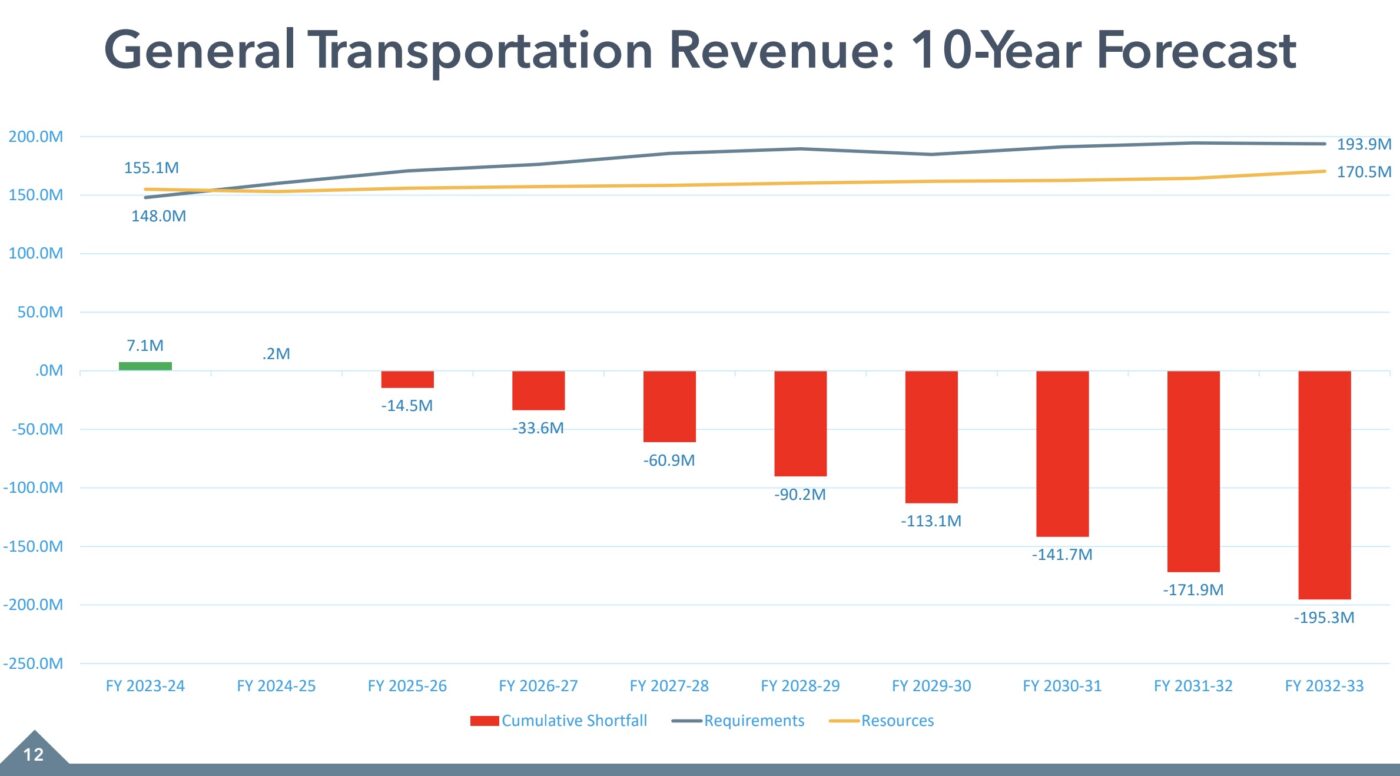
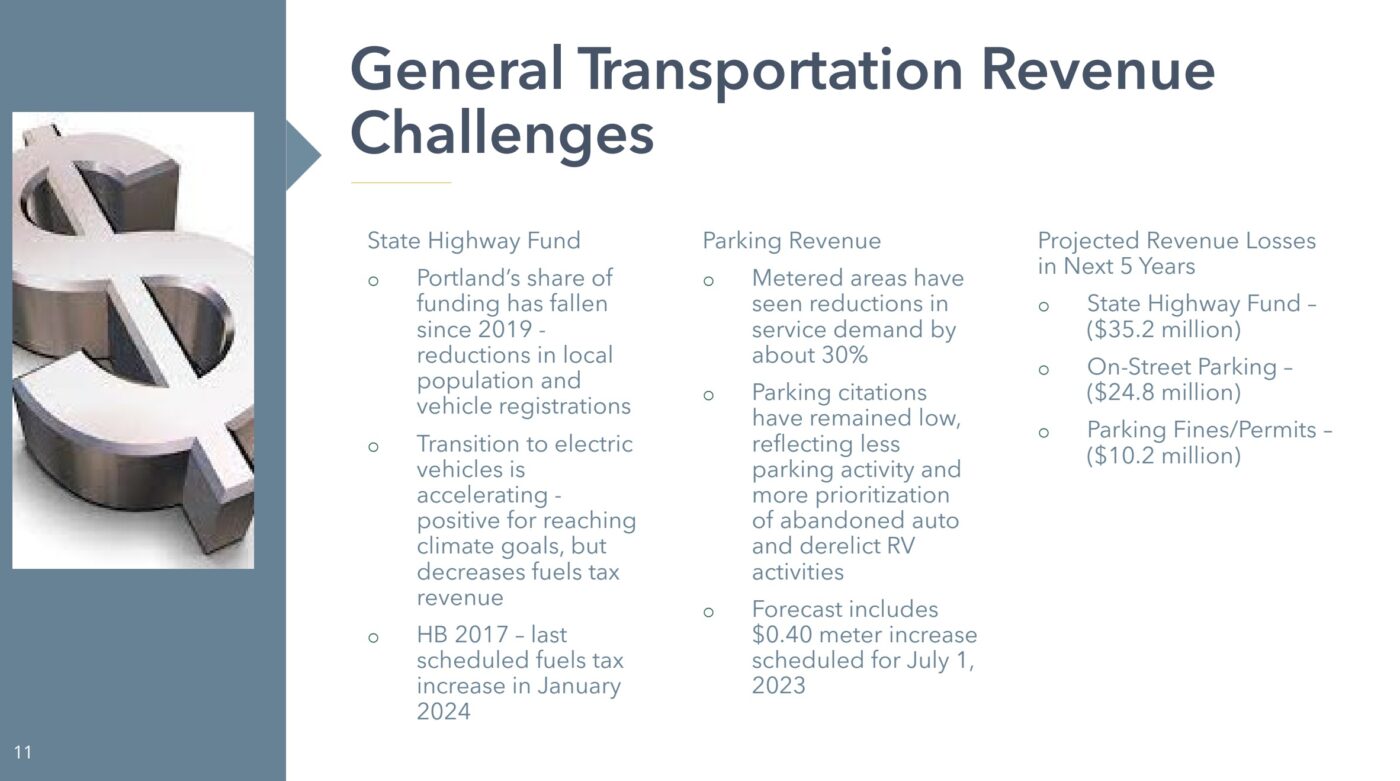
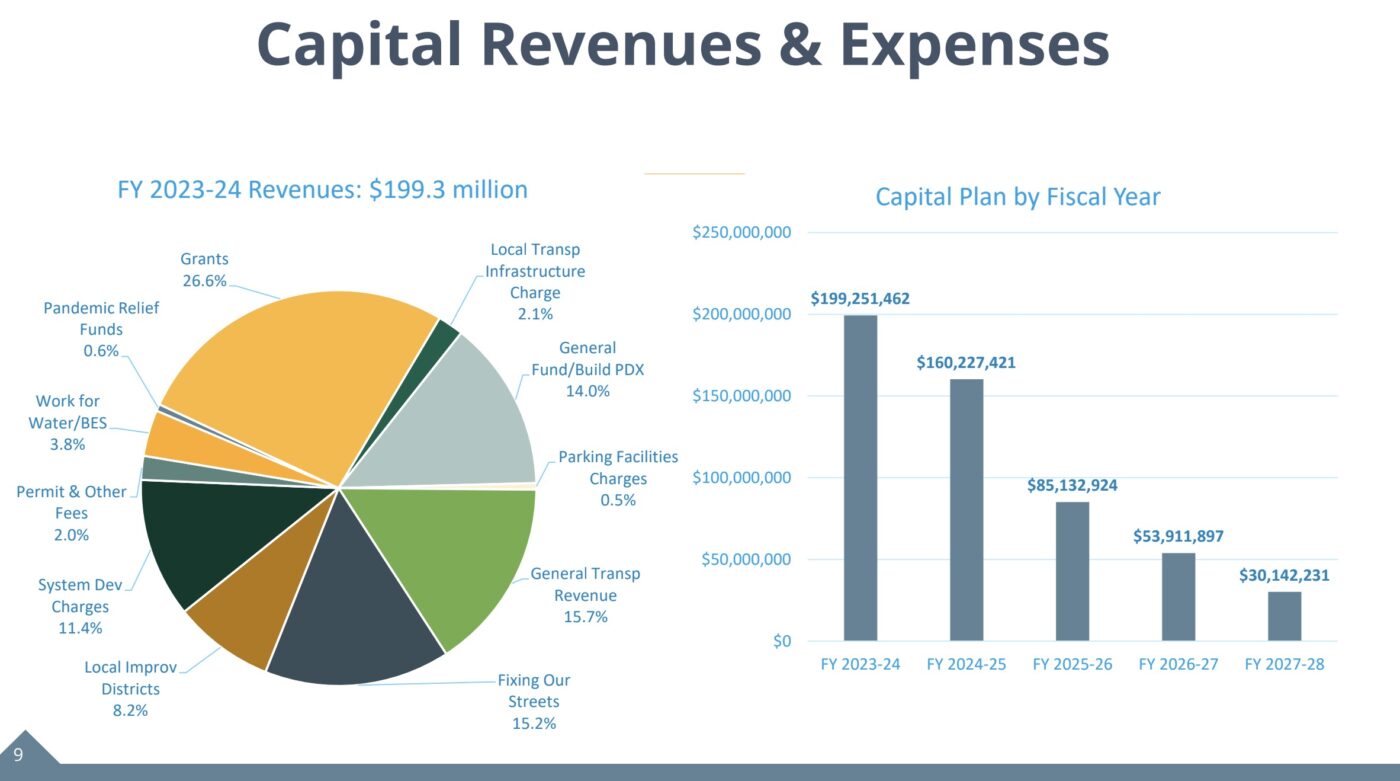
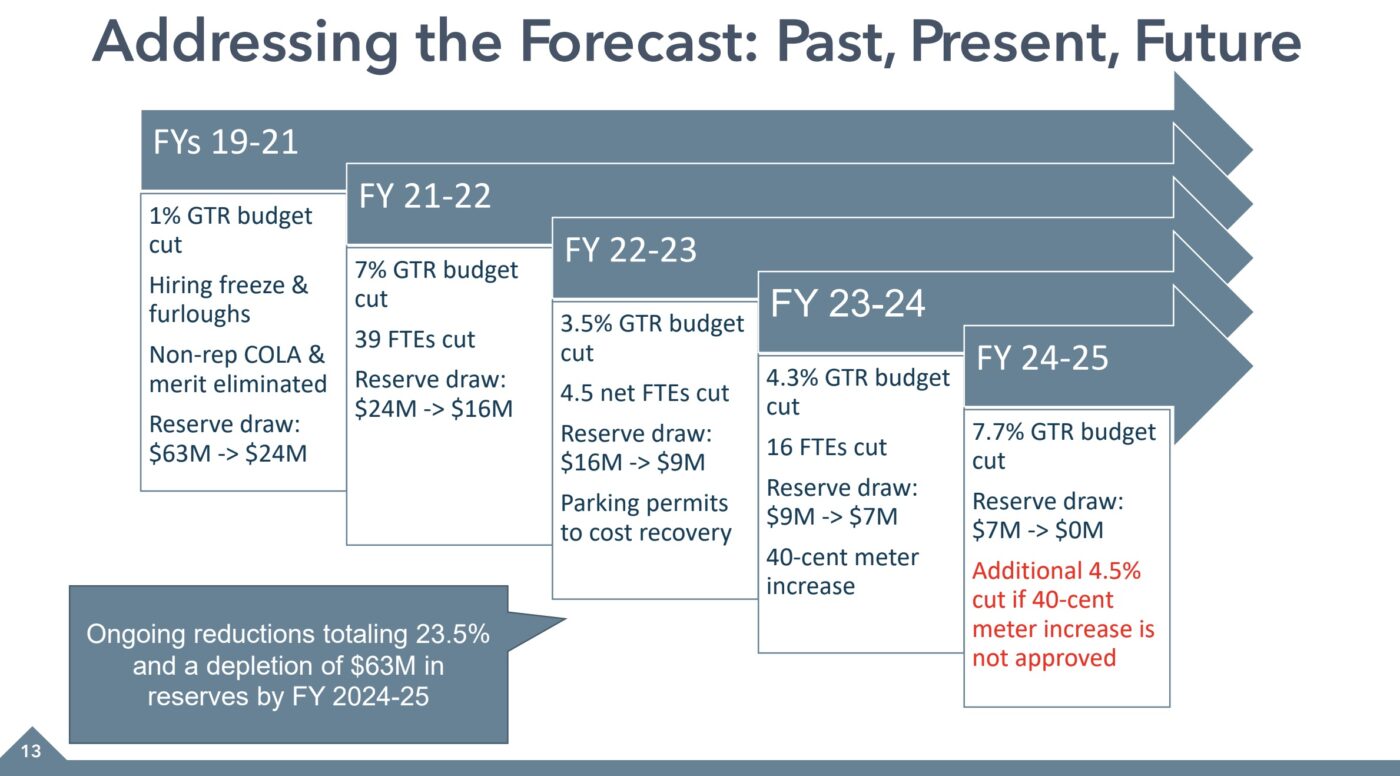
Since 2019, PBOT has dipped way into their reserves to stay afloat. But that pot it almost gone and there’s a sense that they’ll drown without new resources. The agency says if they don’t find new revenue, Portlanders will experience “dramatic and visible service reductions” starting next year.
“We’ve expended almost all of our reserves. We have no more couch cushion money to help subsidize ourselves going forward after this year,” Schafer said. “We’ve kind of quietly been covering ourselves with our reserve money through the pandemic, but that’s running out and we aren’t making enough to put more in that bank.” At the start of fiscal year 2024, PBOT estimates they’ll have just $7 million in reserves and will completely exhaust it to cover required cuts (see image above, on right).
At the monthly meeting of the Portland Freight Advisory Committee this morning, Commissioner Mapps began to lay groundwork for the vast political lift he’s embarked on. He didn’t mention the new fee proposal (which I’m sure members of the committee will not be happy about), but he painted a bleak picture. “I’ll be transparent with you folks,” he said. “The only way we kept people out of float over the last couple of years is we dipped into our reserve funds. Today I find myself in a situation where my reserves are pretty close to zero and certainly within the next two years we’ll be at zero.” Mapps said the city faces an “existential challenge” that would soon reach a point where it can no longer be confined solely to the transportation bureau.
“Next year when I face really severe budget cuts, one of the things I’m going to have to do in order to keep services going is go to my colleagues on council and ask them to subsidize PBOT through the general fund,” Mapps continued. “Which basically means that the cancer which is beginning to consume PBOT will metastasize through our entire government.” Put clearly, this means PBOT would compete directly for funding with bureaus like fire and police. Another thing Mapps was alluding to with his cancer reference was that starting next year, the agency will be integrated with the water and environmental services bureaus as part of the “public works” department and will file a joint budget.
“So there’s a new level of urgency,” Schafer explained about the governance change. “Our big problems will start to become problems for the entire city.”
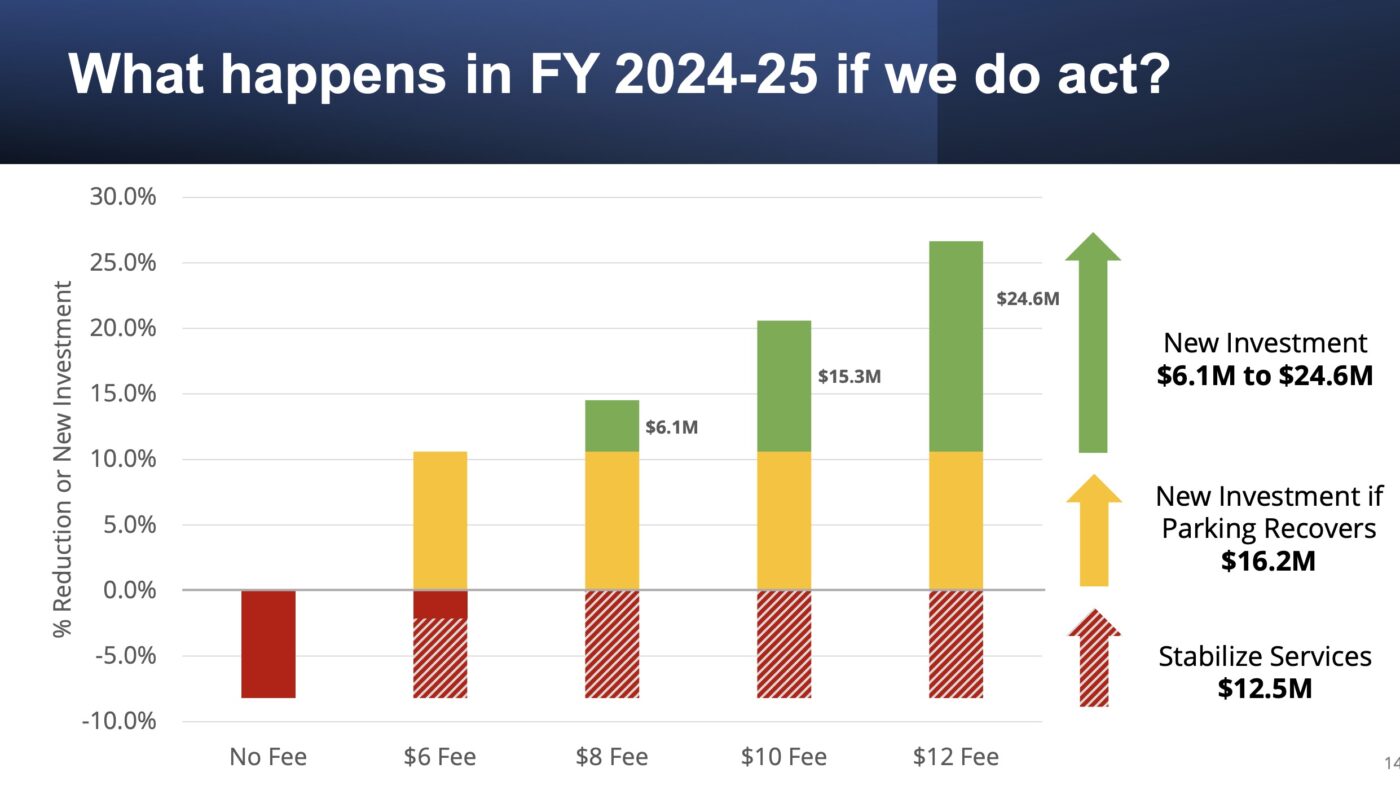
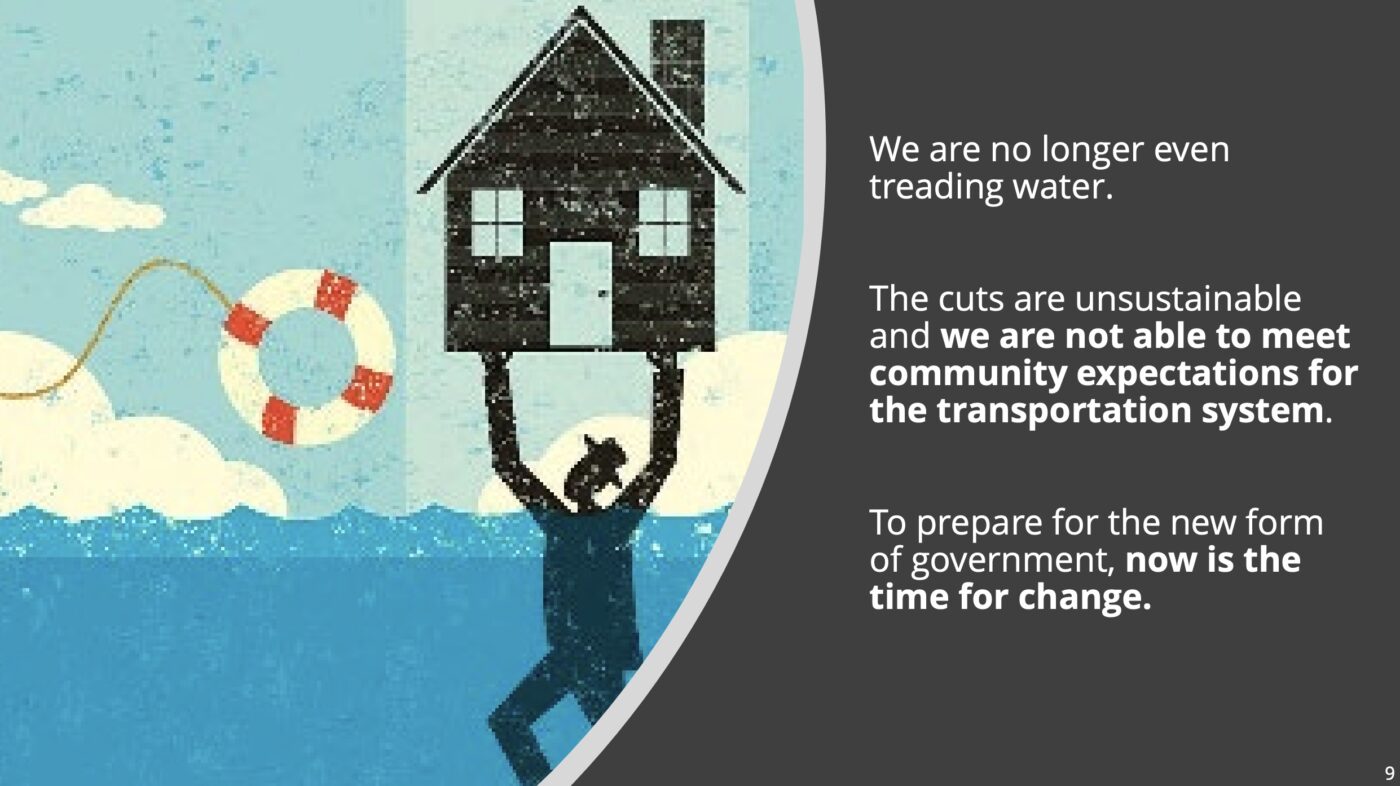
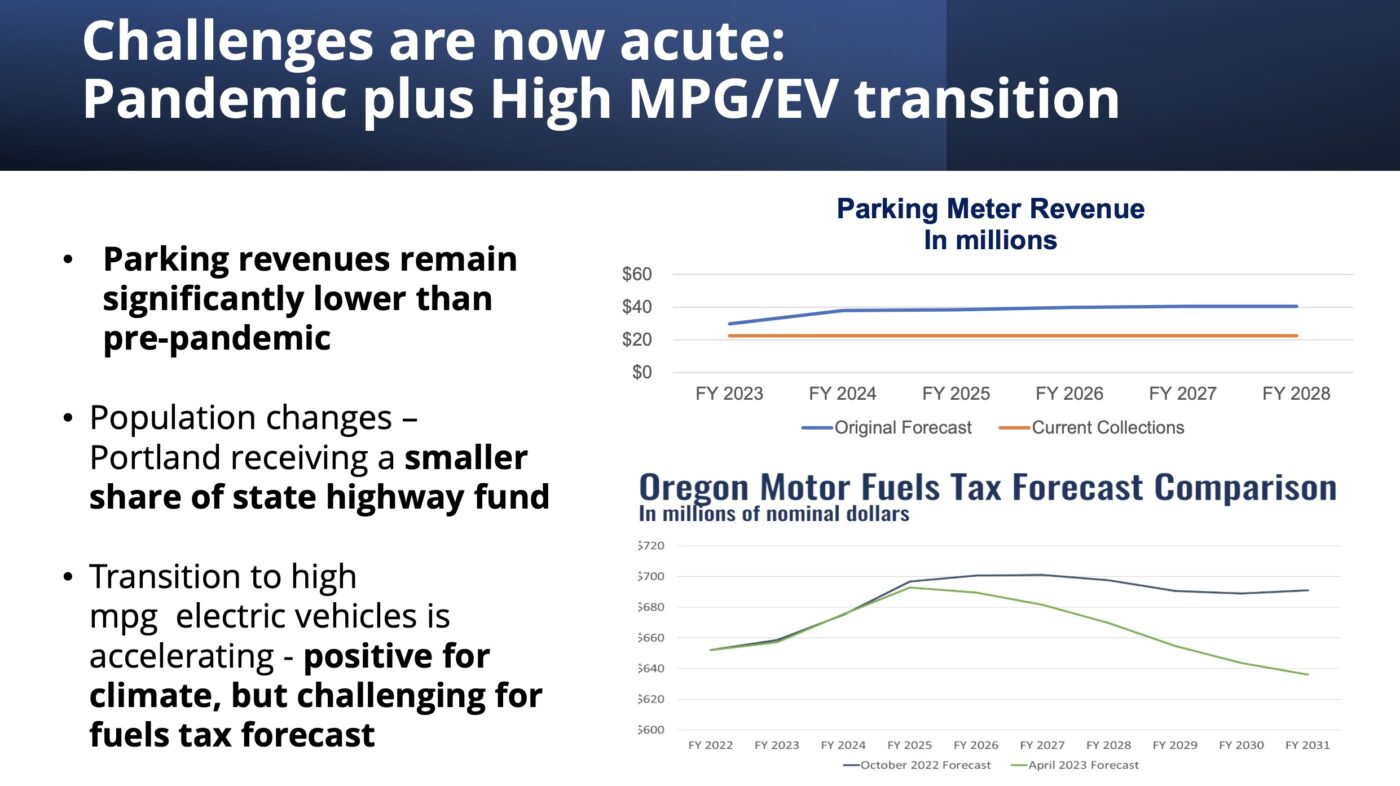
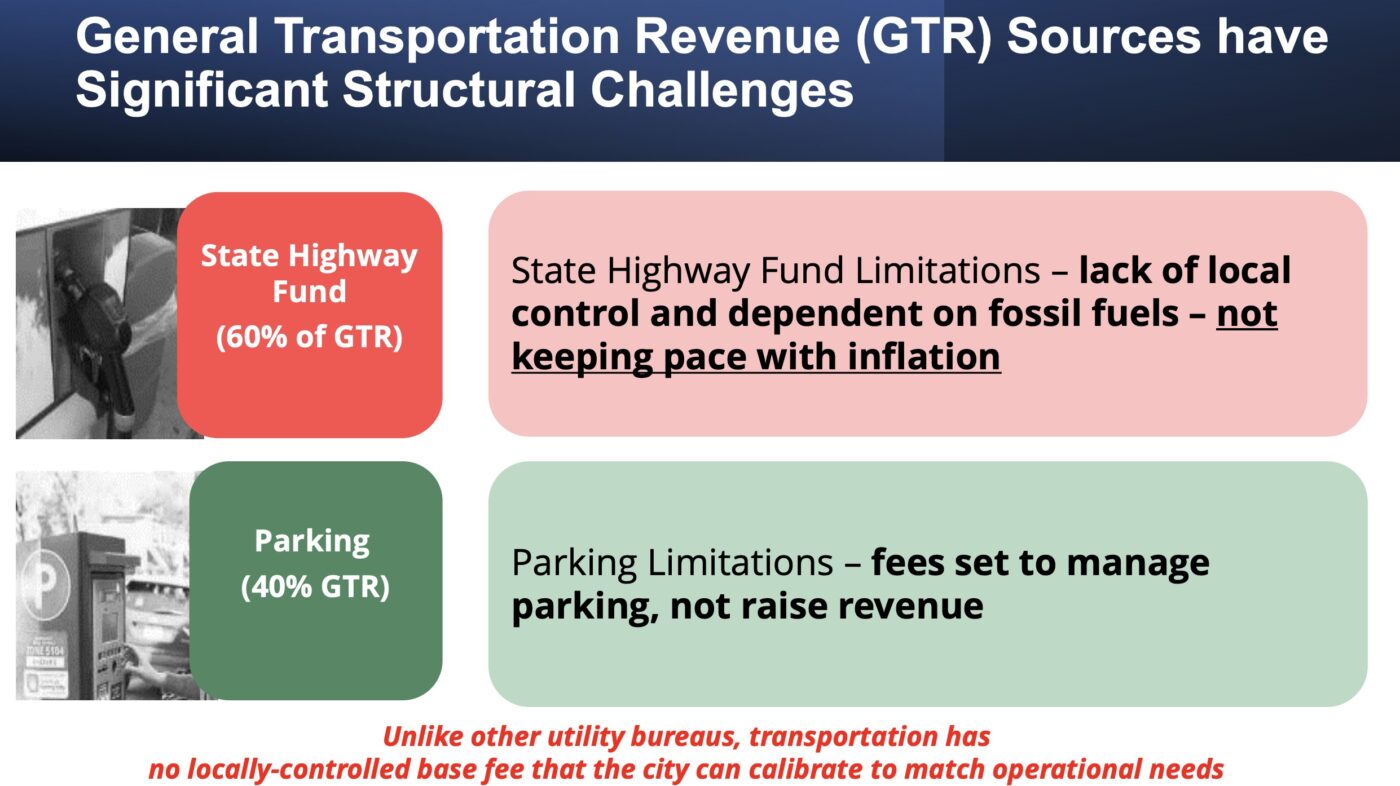
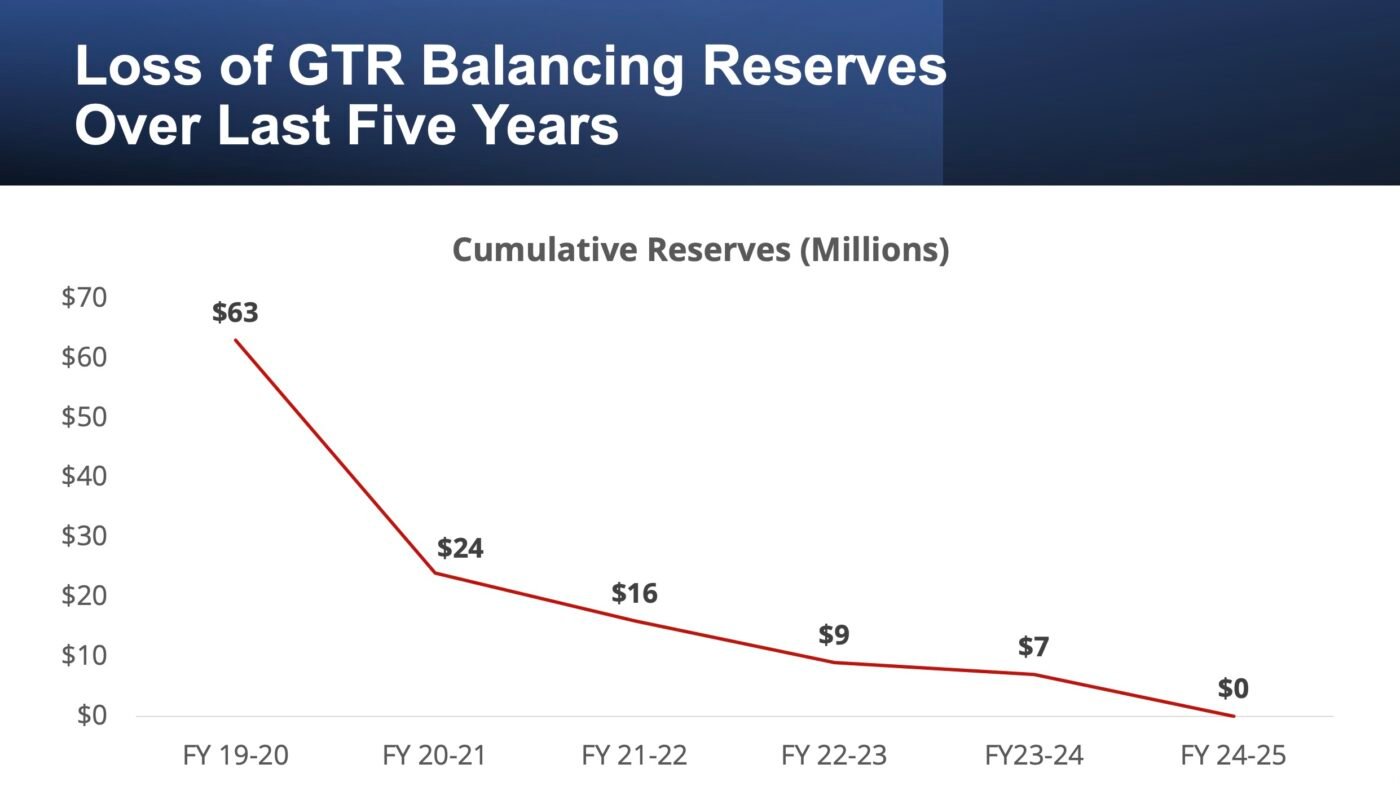
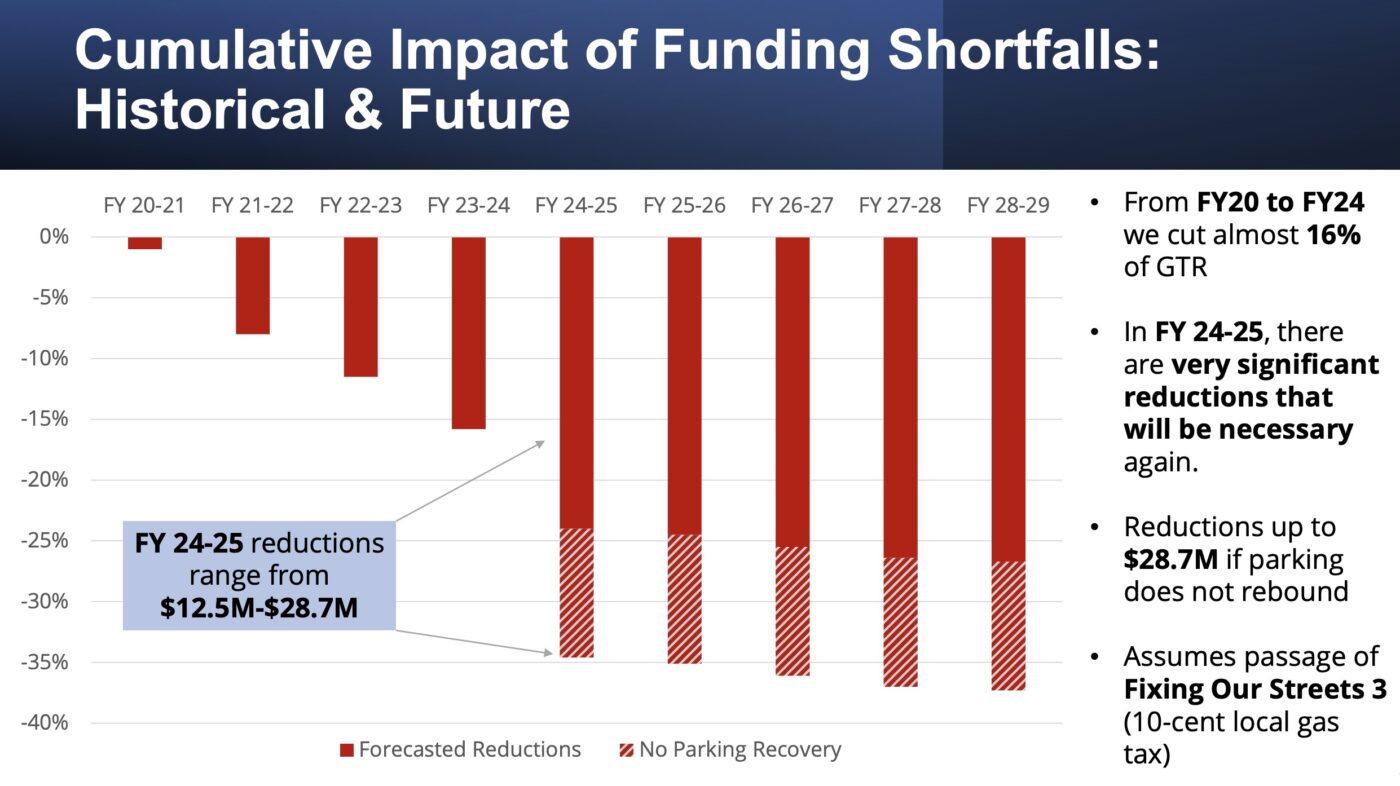
Mapps has grappled with this challenge since he took over the bureau five months ago. At a City Council work session in January, he asked the city’s Chief Administrative Officer Michael Jordan for his opinion about asking voters to support a bond measure to fund transportation. (At that same meeting, Jordan put the state of PBOT’s budget in very stark terms. “To be honest Transportation is slowly going out of business… and it’s going to get worse instead of better,” he said.)
Mapps and budgeting staff at PBOT have been clear in meetings in recent months that no single source of new revenue will suffice. This new utility fee would be just one way they address the issue. “We have a basket of options here,” Mapps said to his Council colleagues back in March. “I have a bias towards having multiple funding streams.”
PBOT Business Services Group Director Jeremy Patton told Mayor Ted Wheeler and the rest of Council at that budget work session in March that PBOT could double the local gas tax (that funds the Fixing Our Streets program) from 10-cents to 20-cents. But Patton and others at PBOT and City Hall know they have to tread lightly. Voters have overwhelmingly passed that tax increase twice in the past, but this is a different era and government distrust and general public anxiety are at all-time highs. If PBOT asks voters for a larger gas tax increase and it fails, the agency would lose not just the additional revenue, but the entire program that currently raises about $16 million a year for essential paving and safety projects would be gone.
The push for a utility fee will be very hard and will come with significant political peril, but Mapps seems more than willing to take it on.
At that budget work session in March, Mayor Wheeler turned to Mapps and said, “Given that the next time we turn around, 10 years will have gone by and we could have a $193 million revenue gap. What’s the plan?”
“Mayor,” Mapps replied. “I think that comes down to political leadership. It’s my job to come up with a plan and I will… I’m convinced that we can get this right.”



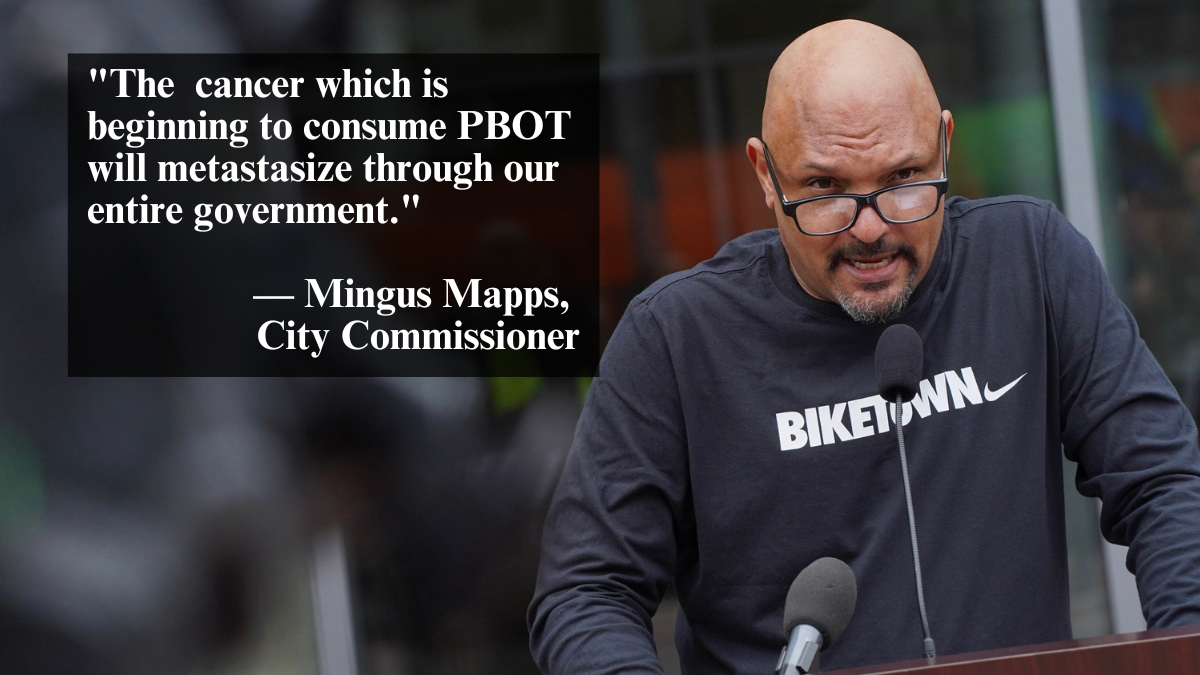
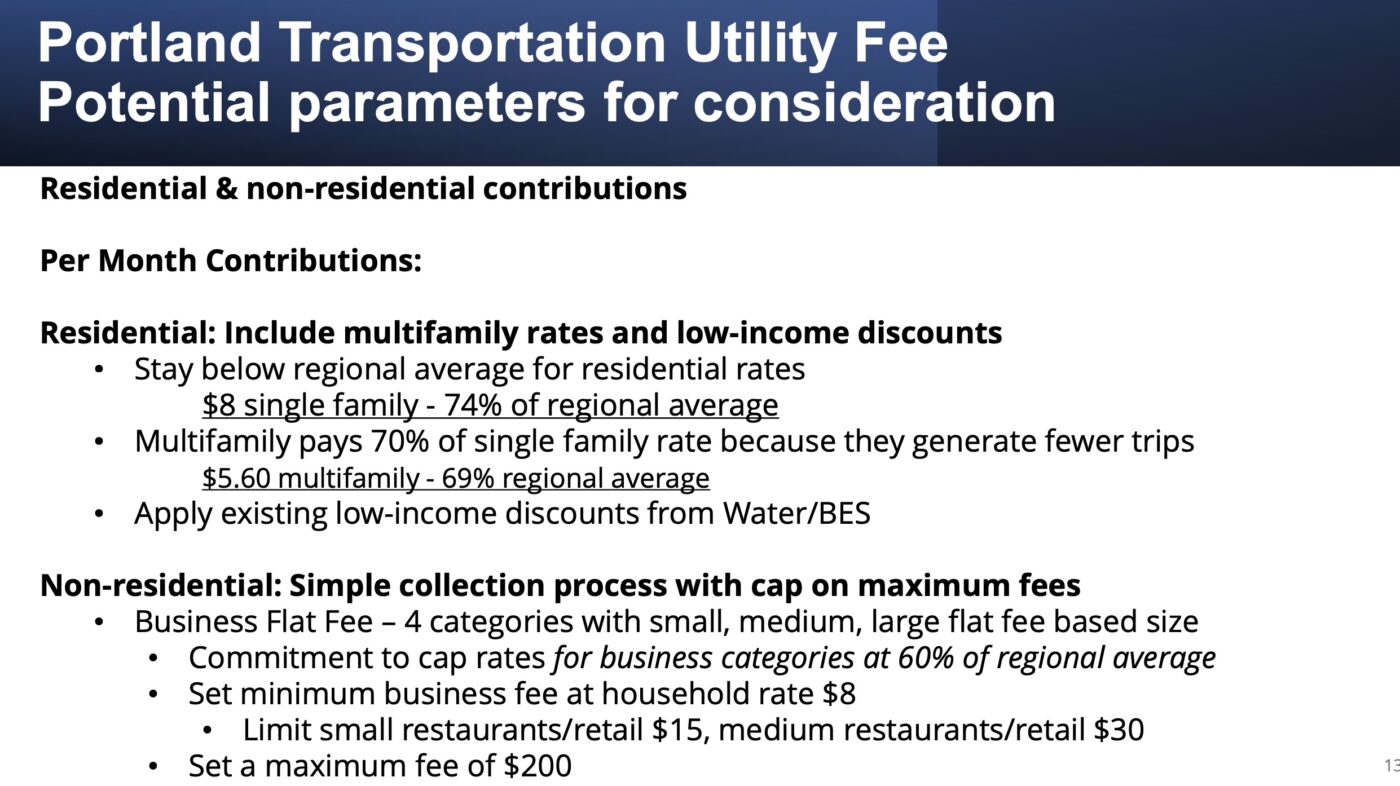
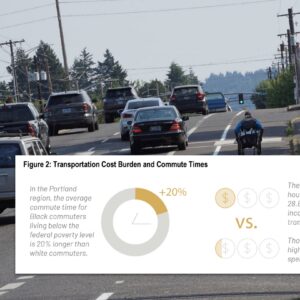

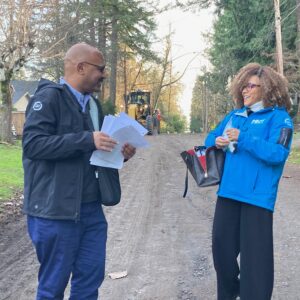
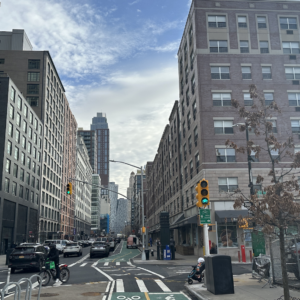
Thanks for reading.
BikePortland has served this community with independent community journalism since 2005. We rely on subscriptions from readers like you to survive. Your financial support is vital in keeping this valuable resource alive and well.
Please subscribe today to strengthen and expand our work.
I have been trying to promote a utility fee of around this size to replace Trimet boarding fares. Mapps is out here taking that idea but wanting to spend it largely on single occupancy motor vehicles.
That isn’t my interpretation. If we want to see PBOT build adequate pedestrian and bicycle facilities, the bureau will need to find stable revenue.
The only thing I find frustrating is how “little” money PBOT needs to be stable. The State of Oregon is planning on loaning $1 billion dollars for a freeway expansion project, but can’t give $60 million to a department working to make streets safe? Feels like a crime
It feels like a crime that the state doesn’t just give money to a poorly run transportation bureau in Portland with money it gets from everyone else in the state?
Can you explain what PBOT runs poorly? I might just be naive, but I think pretty positively of PBOT.
PBOT spends millions on ‘outreach’ to find out what they already know. The pedestrian plan, the bike plan, the multiple in-motion plans. Someone else pointed out that they spend $5 million a year pouring gravel into the street to make gravel roads through streets. They spend millions to paint white lines on the ground. Not to mention the bloat in the management class. Nothing works well at the CoP, PBOT included.
It is typical bureaucratic reactionary budget management and capital allocation. They could see the landscape altering for their funding mechanisms for years, yet they do nothing until it is an outright emergency. Call me pessimistic, but I don’t think they get a pat on the back for cutting 59.5 FTEs out of 1000 employees over a three year period and calling that an attempt to fix the situation meanwhile they burn reserves like it is their job.
Most Portlanders get around primarily in single-occupancy vehicles. Here’s an idea, make it a little more, let’s say 15 bucks a month, but it wraps up road improvement AND transit boarding fare replacement.
Residential car and truck infrastructure is too expensive to maintain. Our monstrous arterials are too large as well. PBOT needs to start planning for a more sustainable budget and future by replacing roads with green spaces and narrowing stroads. They can start by removing the street block in front of my house. This reckless pavement party has gone on long enough. It’s time for PBOT to be the adults in the room and start phasing out cars and trucks.
I up-voted this comment for its pure bravery.
So you want Portland to be a community only accessible to those who have the cash to pay for the upfront seats? I mean, cool if you don’t mind it shrinking considerably.
The city is planning to send monthly bills of $8 or is this a yearly fee?
It seems like a dumb unfair way to collect money for roads…. If they insist that this is a fee that all pay regardless then why not just add it to the water bills like a bunch of other fees are?
Kotek just vetoed Tolling which is the fair way to pay for roads…..
Why not add it to the car license fees?
Why does a person who rents and does not drive pay the same fee as someone who might own a couple of cars?
Am I missing something?
Cyclists already are paying a bike tax on purchases…
She didn’t veto tolling. She temporarily paused ODOT’s Abernethy and Tualatin River Bridges tolling project, because they were being pushed outside of the regional tolling context and process. AND the Environmental Assessment was being criticized on issues of prematurity and inadequacy of alternatives.
And she caved to craven politics over sound transportation policy.
Between this and her handling of blatant corruption with Shemia Fagan, it’s pretty pathetic….
How should she have handled the Fagan story differently? The story broke on Thursday and she was gone by the following Tuesday. We don’t know about conversations had behind closed doors, so for all we know Kotek was pushing for her to resign?
She should have immediately, publicly demanded a resignation for such bad judgement. It was not even a close case.
Fagan will be lucky if she is not criminally charged for bribery.
It’s always about reaching into our pockets. No. No more!
Charge for on-street parking everywhere 24/7 and implement variable rate parking based on demand. It generates revenue and promotes alternative transportation. It’s only fair that those who use parking spaces in public ROW should pay for the space it takes up.
There’s no feasible way to make this work. What would the enforcement on that be? If PBOT is running so far in the red they definitely can’t afford to install a parking meter on every block.
Just a shot in the dark… but how about a Portland parking pass. Either you buy one each year and display it in your vehicle or your vehicle gets impounded if found parked in a public right of way. It might clean up some of the derelict vehicles clogging up the residential streets in the inner neighborhoods too. As long as you don’t park your car in the street you pay nothing, and it encourages public transportation/bike use for people who live close in and don’t want to buy a pass.
I like this idea, particularly because you could charge more for larger vehicles. But you’d still need some solution for out-of-towners visiting Portland (particularly those visiting for the first time who shouldn’t be assumed to know of such a parking pass), and it’d have to be something pretty accessible at the point of parking (without assuming everyone has a smart phone) – I’m not sure how you do that besides parking meters everywhere.
Lots of toll systems have a pay by mail thing where they’ll mail you a toll to the address your car is registered at:
https://wsdot.wa.gov/travel/roads-bridges/toll-roads-bridges-tunnels/tacoma-narrows-bridge-tolling
https://www.goldengate.org/bridge/tolls-payment/toll-payment-options/
That’s what Chicago does. An issue with that is that it still means PBOT is dependent on people owning cars for its funding, which provides a poor incentive for them to limit car use and ownership.
This! Why should placing dozens of square feet and thousands of pounds private property on the public right of way be free anywhere, anytime? Clearly, we need to stop subsiding automobiles.
Might a new revenue and investment proposal like this be more attractive if residents has some direct voice and vote over how a portion of the funds are spent rather than leaving it entirely to insiders and “experts?” After all the, greatest needs for our transportation investments are diffuse, human-scale, safety improvements in every neighborhood. Ordinary users of the public right-of-way have untapped knowledge that can and should inform and direct investments on their behalf. The good process could draw on both technical knowledge and data and the expertise of ordinary residents who use the streets to identify the improvements. An even better process would center those who have greatest barriers to influencing government investment decisions. Seattle does this through their Your Voice Your Choice participatory budgeting process. Portland could too.
Enact a vehicle weight tax, the heavier your vehicle, the more you pay
And a city-wide parking permit. why should the city subsidize free parking? Neighborhood streets, esp in areas where there is a lot of infill have streets clogged with surplus cars? Huge source of revenue, untapped.
Maybe they could stop spending gas tax money to maintain gravel roads that have not been historically maintained by the city?
https://www.portland.gov/transportation/maintenance/portland-gravel-street-service
https://www.portland.gov/transportation/fixing-our-streets/fixing-our-streets-projects
$4 Million dollars spent to maintain non-city maintained gravel roads
$5 Million on potholes on city maintained paved roads
My question is why are “50 miles of gravel streets which are not maintained by the city” being maintained by the city as “a service free for residents.” ?
$4 million dollars could go a long way to support the residential street sweeping program that is rumored to be on the chopping block.
That’s $4 million over a 5-year period, or $800,000 per year, on streets the city took over from the county and are legally obliged to maintain per their long-ago annexation agreements with the county. Compared to rebuilding these streets, usually in poorer BIPOC parts of the city, $880K/yr is a bargain for the city’s taxpayers.
I’m in favor, on three conditions:
(1) The money raised CANNOT be used for anything other than road/sidewalk maintenance and safety improvements. No raiding it to pay for other projects.
(2) At least 80% of the money raised is spent in the neighborhood where it is collected, with the remainder re-allocated across the city to where it is most needed.
(3) The City sets up some kind of process to give residents of each neighborhood input on what their repair/safety priorities are, and generally to follow those priorities.
Also, City Council shouldn’t just impose the fee and weather the political fallout. They should send it to the voters and ASK US to approve it.
The conditions I suggested above should help sell the idea: people will be voting to fix their own local streets, rather than throwing money into a transportation slush fund that might be spent on some glamour project across town.
Do you think it is fair that Home Depot for instance, that generates a lot of vehicle traffic should pay $200 maximum a month for road fees and a retired older person who does not even drive or own a car pays $8 a month?
The idea of even setting up and billing and collecting $8 a month is pretty ridiculous on the surface.
Mapps is just not up for this job if this is the best he can do.
I’d prefer if businesses like Home Depot were billed at a higher rate if they generate a lot more traffic. I’d be willing to revisit the cap later, though, once the policy is in place. I see no value to letting the perfect be the enemy of the good.
I don’t drive or own a car. I still use the roads, though. I walk on the sidewalks, bike on the streets, ride with friends, take buses, and get stuff delivered to my home. It’s fair that I pitch in to keep the roads maintained. Same for the retiree in your example.
Collecting this fee would be super easy. Just add it as a line item to the water bill that every property pays to the City already.
While I don’t agree with spending such a utility fee on single occupancy vehicles as mapps seems to be planning, this is an efficient way to generate revenue. Corvallis does this for transit, charging 10 dollars per household and providing fare free transit services. Tri-met could replace their fare revenue for fees similar to what Mapps is promoting and there is a very low cost of collection since it would just be added to the existing utility bill that we all pay every 3 months. I don’t like what Mapps wants to spend it on but this isn’t the arts tax where they invented an entire new method of taxing people and a big chunk of the revenue is lost to how expensive it is to administer the tax.
#3 I dunno, Douglas. My wife has the strength to occasionally read our outer SE neighborhood Facebook page. People scream about bad drivers. The city lowers a speed limit and then they scream about that. Pedestrians get hit and killed because the streets out here are wide and fast. Everyone blames the pedestrians. Changes are made to calm a street (Division). Everyone screams about a tyrannical city hall that doesn’t even want us to take a left turn on Division any more. It’s completely insane.
It would be pretty neat if PBOT made all of our streets calm and mellow for all users. I want to believe that’s what most of the employees of PBOT want. Right?? I don’t know if asking the public about traffic engineering issues is really the way to go considering most of us are not traffic engineers, rather, just a bunch of impatient people that want to drive anywhere, anytime, with no perceived inconveniences along the way.
lockboxing doesn’t work and I can give you a great example of why. In the early 2000’s I was on the transit committee for the city of corvallis. We crossed over into being a higher population center (total number of people in connected grid segments with more than a certain population) and as such qualified for like 500k in additional funding that was dedicated to transit. Awesome right the portion of our transit budget paid by the city at the time was only like 700k and so this was going to make a big impact. Not so fast, the city council voted to reduce funding for transit from the general fund by basically the same amount as the increase so suddenly money that was supposed to be only able to be spent on transit was just extra money in the general fund that could be spent on anything they wanted to.
The ability to transfer funds away from a program depends on how much discretionary revenue is already being spent on it. As I understand it, PBOT is already run largely on dedicated funds, taking in very little general fund money. PBOT gets state and local gas taxes that the Oregon constitution requires be spent on road construction and maintenance, with very limited flexibility. They’re unlikely to lose that, except to the extent that the revenues themselves dwindle. But right now, I think the City of Portland spends very little general fund money on road maintenance, so they can’t easily pull a bait-and-switch with a road fee.
However, PBOT does get parking meter revenue that isn’t constitutionally restricted and could be redirected. So maybe the city should look at a charter amendment that explicitly dedicates some share (50%?) of parking revenue to road maintenance and safety. (If Portland is going to get serious about keeping the streets fixed over the long term, of course.)
Ahem. Am I the only person who is already taxed heavily and sees little in return for the tax? The city is a mess and the elephant in the room, the homeless crisis, is sucking the funds from every agency. More taxes so that the city can pour more money into ineffective programs does not get my support.
Whatever they do, it needs to be part of an existing tax, or collected in the same process. No new, convoluted, Admin-heavy taxes!
But the Arts Tax works so well!
Another tax.. F that!
Seriously, high taxes already and limited services. This is getting ridiculous.
They should try firing most of the executive team to start. That would free up quite a bit. Considering how poorly PBOT is run, we could replace them with cheaper folks who can actually accomplish things.
I think this is a fantastic proposal and fully support it.
Regressive taxes that low income people, who don’t drive, but will pay the same amount per year as any Millionaire in the West Hills pays, that will be about impossible to collect fairly, is fantastic?
Our education system is completely failing us.
It’s interesting that so-called “progressive” urbanists always support regressive flat taxes. Pay no attention to what they say, pay attention to who their policies benefit and who they want to tax to pay for their “let them eat cake” Jacobsian utopia.
It’s just embarrassing. Mapps actually presented this flat tax to the Street Trust and they signed off?
Maybe we should just tax food to pay for roads…
Urbanists:
Fair taxation or a few more slip lane “plazas”?
Slip lane plazas with astro turf grass and cheap lawn furniture!!!!1!!!!!
dwk,
Portland is going to run out of “rich” people soon if it continues with this path of only taxing evil wealthy people. The Homeless Tax, the preschool tax which kicks in at $125,000/year and now a proposed capital gains tax. Then there is the wasteful 1% PCEF tax…..did that have anything to do with Walmart and REI leaving? The issue is people don’t really care about whether a tax is good one if they don’t think it will affect them. This leads to very poor public policy and introducing poor and inefficient taxes.
Exactly right! Instead of super-high tax that effects only a few people and businesses, which doesn’t generate much revenue and makes them mad enough to lobby against it and win, a “broad base, low rates” approach where everyone pays a tiny amount is a way to generate a ton of revenue, there’s a sense that everyone pays and everyone benefits, and you don’t have to worry about some percentage not paying because most people will. Whereas a tax on the ultra-wealthy is easy for them to dodge and it’s a bigger hit when they do.
Broad base, low rates. Read about it. Also they have a low-income discount. Also, I don’t care if you drive or not, everyone relies on the road system unless you never leave your house.
It’s telling that you wrongly assume that someone who would like to see Portland’s upper income elite start to pay their fair share is not a transportation cyclist. Urbanists coopt the language of progressive politics while being sneekily opposed to its core tenents: making the rich, the real estate speculators, and investors pay their fair share.
I did not see dwk’s complaint about paying taxes above so disregard the first sentence, Atreus.
Our taxation structure is so progressive I think it is perfectly fine for this one to be a little more regressive, but I’m crazy and don’t think it is reasonable to grab 0.75% of capital gains to pay for people to defend themselves against eviction when we have the renter protections we do.
A capital gains tax that you appear to have pulled out of a strawperson’s hat…
We just voted on it, it’s not a strawman….You are aware of what is on the ballot?
It’s a strawman because it has absolutely nothing to do with the present discussion about a regressive flat tax. I still have no idea why it is being discussed in this thread.
A couple comments above you literally discuss “making the rich, real estate speculators, and investors pay their fair share”. All of those are taxed via heavily progressive tax structures and real estate and investments are taxed via capital gains.
I can see if you’re of the mind that you live in a regressive tax hell scape and the rich are just making off like bandits here, you may want to avoid discussion about progressive tax structures in Oregon and Portland as a whole. Of course that’s not the case, you live in one of the most progressive tax structured states/cities in the entire country. The top 20% of wage earners pay 2x in net tax receipts than the bottom 80% combined. They pay the most in property taxes and the greatest share of capital gains. You may think they should pay more, but to fall on “fair share” is just hilarious.
LOL at this. The single most progressive tax levied in Portland is the state income tax where an individual earning $10,000 pays almost the same marginal tax rate (8.8%) as a wealthy person earning $1,000,000 (9.9%). And, enragingly, most of the taxes in the Portland area are the kind of regressive regime that would cause Rand Paul to faint with pleasure.
And your numbers show just how @#$%ing regressive Oregon’s tax system is.
The top 1% of Oregonians earn substantially more income than the bottom 50%. If we had even mildly progressive taxation in this $%&#hole state the top 20% would pay a heck of alot more.
https://www.ocpp.org/2022/10/31/income-inequality-oregon-hits-new-record/
And of course wealth inequality is even more extreme (in large part due to the capital appreciation of people who like to complain about their property taxes.)
The top 1% paid 3x the bottom 40% in taxes, that’s progressive, but feel free to roll the dice and try to wring ever more out of these folks you deride so much and see how hard they are to replace.
Progressive taxation does not mean that the rich pay proportionally similar amounts as working class people but that they pay far more (e.g. their fair share — because they can very easily afford it). In fact, in many democracies (e.g. not the USA) total transfers to low income people are sharply negative while transfers away from the rich are steeply positive. This progressivism is a socioeconomic mileu that is diametrically different from Oregon’s deeply ingrained regressive conservatism.
I am not sure if the cognitive dissonance is satirical, but the rich literally pay multiples more than the working class here in OR.
https://fred.stlouisfed.org/series/CXUFEDTAXESLB0102M
Chart at the link shows negative tax payments by the lowest quintile of income earners at the federal level due to transfer payments. So, yes, in the USA the poor get more than they pay in and the rich pay more than 50% with many state income taxes included, so that’s a progressive income tax structure by definition.
Speaking of cognitive dissonance and the desire to defend extreme right-wing flat taxes:
ITEP estimates that the bottom 20 percent of Oregonians pay 12.8 percent of their income on state and local taxes. Those in the middle (with incomes under $57,100) pay 11 percent. Meanwhile, the richest 1 percent of Oregonians, with average incomes of more than $1 million, pay 8.2 percent. No other group pays less as a share of income than the richest Oregonians.
https://www.ocpp.org/2021/04/07/flip-upside-down-tax-system-oregon/
“Fair” is a very under-specified word in this context. It is equally true that the rich do pay their fair share, because “fair” can mean anything you want it to.
Starve the bleepers out.
Just like the ULF, what could possibly go wrong?
If they wrote into the statute that it can only go to PBOT, just like BES/Water ratepayer funds, it should avoid that problem. It always sounded to me that the ULF was not written with any actual protection against it getting raided for other purposes.
Where do the taxes end? Property taxes on downtown condo’s have doubled in 10 years while actual property values have stagnated. The arts tax, the Supportive Housing tax, the Preschool for All tax, the Gross Receipts Tax, and soon enough a capital gains tax. This is just tax and spend. People can vote with their feet and every year Portland has made Clackamas and Clark counties look ever more attractive.
Property tax growth is capped at 3% per year in Oregon, so how could they have doubled in ten years?
Homeloaners are constantly “improving” their
homesprecious.Easy, there is no cap on bond measures. So it’s more accurate to write that taxes go up a minimum of 3% plus whatever bonds have been passed.
increases to the mill levy due to property tax referendums and 3% increases as you note. Might be tough to get to 2x in 10 years, but not hard to see how it gets close.
I can’t speak for everyone, but the property taxes on the condo I rent have gone from $3,523 in 2012 to $6,164 in 2022.
The assessed value can normally only go up by 3%. The assessed value is just one component of the property tax paid. Tax rates on the value can change resulting in a higher than 3% increases in the yearly bill.
Also, any work or “improvement”, a so called “Exception Event”, on the property can trigger a reassessment of assessed value beyond the 3% threshold. For example, buy an EV to replace your ICE car that requires a new electrical service? That may increase the assess value of your property substantially in the eye’s of the county assessor.
3% per year property tax control for homeloaners but it’s legal to increase the rent by any amount in many buildings and 15% per year in the rest. And, of course, homeloaners get to deduct their mortgage payments while renters are taxed on all their rent.
FWIW, my property taxes have increased by 59.6 percent between 2013 and 2023.That’s more than 3 percent annually due to levies and bond measures.
I purchased my home exactly 10 years ago in Portland. I paid $136k then, and prior to the recent dip in prices it was valued at over $400k. My property taxes have only increased by 37.5% in that time… seems pretty reasonable to me. I certainly would never entertain moving to Vancouver or Clackamas over it. I do wish they would stop adding weird new taxes that aren’t collected by a regular tax return. Increase the income tax on top earners and add a capital gains tax and call it good. Pay for roads with registration fees and a city wide parking pass program. If that is too tough to implement then maybe a parking lot tax based on number of spaces, that might encourage less asphalt and more alternative transportation use, if Home Depot starts installing parking meters I would certainly modify my driving habits.
If they can get the business side of the fee “right,” great. The prior edition had a home-based graphic novellist as an 8-employee business; a home that had not been a 3-staff medical office for 20 years, as a 20 employee medical office; and didn’t show any businesses in Cascade Station. So much distrust of the base data, which impacted the estimated revenue. It was kind of a “cluster****.” If they can acknowledge that home residents sometimes have one-person, non-trip generating busineses, and that “Big Retail” generates more than 4x the impact of a mid-size restaurant, and develop a scaled fee. Go for it!
They should avoid using ITE trip generation tables at all costs. That’s what got the last proposal under Novick in trouble. ITE trip generation is BS and everyone knows it, and businesses pretty much all said they would challenge the rates, which means the city would have to do actual manual counts at every business. It was unworkable. They should come up with a small number of fee tiers and just base it on number of employees or gross receipts or something, not “trip generation.”
The root problem wasn’t ITE Trip Gen; it was that the business license data they used was from multiple sources and some was seriously outdated. Then blanket assumptions about # of employees, regardless of actual size. The building that housed Stumptown, Woodsman Market, and Woodsman Tavern was cited as having the same number of employees as a retired accountant who had a biz-lic to do his friends taxes and do some private consulting (eight employees each). Those distorted employee numbers led to distorted estimates of revenue. After all, it would be the small biz doing all the appeals…mis-sized mid and large businesses wouldn’t.
I’d feel a lot better about giving PBOT more money if city hall wasn’t overrun with PBA lackeys, if Mapps didn’t just give his full-throated support to the I-5 Rose Quarter Project, and if I didn’t ride through the intersection of NE 7th and NE Tillamook twice a week.
If I’m confident the fee will go to core PBOT work – roads, crossings, bike infra – then I’d gladly pay it. It’s less than $100/yr.
If I think the fee will get siphoned off to homeless services or cleanup, I won’t. An absolutely tremendous sum of money is already available for that purpose.
I’m glad Mapps is helming PBOT at this critical point. Hardesty, even if she was ever aware of the budget crisis in her bureau, wasn’t never able to work with the other commissioners well enough to get a fee like this through.
This is a stupefyingly uncreative solution to a real problem that will only get worse until we stop subsidizing driving and parking. Toll the freeways, charge for all street side parking, implement congestion pricing, and switch the gas tax to a miles driven
Tax that’s weighted based on vehicle weight. But to “solve” the problem by just imposing another tax on every resident regardless of driving patterns (or not) is an insultingly blunt proposal.
Michael,
I almost never agree with your posts but this one I do. Yes a blunt proposal that would only continue to drive taxpaying citizens out of Portland. Detroit here we come?
The car-headed democratic governor (that you likely voted for) just cancelled tolling. How does that make you feel?
Wrong. Tolling was not cancelled only paused until 2026.
https://www.oregonlive.com/commuting/2023/05/gov-tina-kotek-hits-pause-on-freeway-tolling-until-2026.html
“paused”
(because — somehow — the establishment will be more supportive in 3 years, right? right?!?!?)
I disagree with the governor’s decision to delay (not cancel) tolling. I’ll probably disagree with her on other issues in the future. I’m still glad I voted for her.
And I’m pretty sure I know what Christine Drazen’s approach to tolling would be. So yea, given the alternative, no regrets.
The climate-arsonist and corporation-coopted democratic party will continue to ignore the need for systemic change until they feel politically threatened.
None of those except parking can be done by PBOT, and the parking one is infeasible given the amount of enforcement that would be required.
Enforcement pays for itself, that is not a hurdle. It’s not much different than funding the IRS, every dollar spent generates more than a dollar in additional tax revenue, it’s a no brainer.
There’s tremendous potential for increased parking revenue (Why should anyone get to park in the street for free? Some areas require permits. More should) and like SF (and many of our paid lots) our meters should utilize flexible pricing adjusted by demand. But PBOT also receives revenue from a local gas tax which can (and should) be raised. Or switched to a tax based on miles driven (which we’ll need as EVs become the default cars) and the the rate per mile adjusted (like vehicle registration rates) based on vehicle weight.
Taxation without sidewalks and bike lanes is tyranny.
Isn’t the overall city budget over 5.5 billion dollars, of which about 550 million goes to PDOT? And somehow the only solution to a 60 million shortfall over 5 years is yet another tax. Seems to me the job description for the new PDOT director that was discussed here a couple weeks ago needs more emphasis on financial acumen and creative thinking.
You see, the definition of a shortfall is that revenues are not as high as expenses. So you need a tax to fill the shortfall. They wouldn’t propose this if there was some pile of unbudgeted funding sitting around. It’s all being used!
Hard to tell if you’re being sarcastic. The problem is indeed that it is all being used. A greater problem is what it already is being used on. Part of fiduciary responsibility (dead last on what the city cares about “The City of Portland is committed to anti-racism, equity, transparency, communication, collaboration, and fiscal responsibility.”) is that a government entity shouldn’t need to constantly request extra tax funds for their normal duties.
Gas taxes will, of course, be sufficient for all road maintenance even after EVs have captured the market.
The city of Portland needs to be committed to providing essential services like police, fire, transportation, parks and trash pick up. It needs to get OUT off the business of providing “political correctness”. Once it gets the essentials down it can start its virtue signaling machine again.
Apparently PDOT does think there is a pile of funding sitting around, it just happens to be in our pockets. We all know a shortfall can be filled by raising taxes or cutting expenses and the latter is my default position. While a dumpster fire of mismanagement rages at city hall I can’t be convinced otherwise.
By the way, I was mistaken with my 5.5 billion figure. The latest proposed budget nets out to something approaching 7 billion. It’s not unreasonable to think we can find 60 million to cut in there somewhere and avoid yet another tax. Try it yourself for fun.
https://www.portland.gov/cbo/fy-23-24-proposed-budget
It’s pathetic that both Novick and Mapps rejected the genuinely progressive taxation method that was overwhelmingly supported by polling of actual Portland residents. But I’m sure that Mapps “polled” the PBA before proposing yet another anti-working-class regressive tax.
Nice retcon. Novick dropped the progressive income tax after the PBA informed him (and Wheeler) that they would campaign against it.
TAXES: Everybody needs to have some “skin in the game”. Passing taxes which only affect a few is not only tyrannical but it also leads to very bad public policy. Look no further than the abject failures of the PCEF tax, the Homeless tax and the Preschool tax. Voters passed terribly designed taxes because they thought “well this won’t cost me anything”. They’re wrong. Those paying bad taxes will leave. It’s already happening. Then as the tax base evaporates services will decline or taxes will need to be raised even further. It’s a death spiral.
Residents are asked to pay extra for the services they want so more money can be diverted to the things they don’t.
Same old story.
Comment of the week!
I would not mind if PBOT went out of business. Actually, I’d love to see it happen. Why? Do they actually care? I doubt it. Are their projects working? On paper they’ll gladly send you a report they came up with but what’s a win? They are losing in the traffic death realm. Maybe vision zero needs a new name? Maybe they need better leadership? Maybe they need employees that listen rather than put their nose in the air and say they know best. I’m not sure. Maybe it’s crazy for me to think that I could actually do a better job to slow the traffic deaths and improve alternative methods of getting around. What do we get instead? We get “well if we slow down the cares then that is the best for all,” meanwhile they take up space on street without bike lanes (that should per 2030) or space for walking. Yeah, they’ve wasted my time and energy so I have little use for them.
Doug,
Your comment implies that PBOT exists in a vacuum, like some corporation or something. PBOT is us. They are public servants who provide essential services. Love them or hate them, when they “go out of business” it impacts all of us in very serious ways.
Regular citizens in Portland can’t even get email replies about problems from city employees who are mostly all working at home.
For most of us, PBOT does exist in a vacuum.
Our city government is about the worst in the country right now. Just feckless do nothings.
Look at the response to Mapps lame proposal. We elected a person who actually thinks that sending a bill for $5:50 each month that will be impossible to actually collect fairly is serious way to pay for infrastructure.
SEE arts tax.
I’ve began to try the ombudsman route. Yeah, they can I act discipline to lazy city employees but they can make suggestion and such. I routinely ask city employees if it’s normal for them to reply to an email a month later…
I fully understand what their role is. I think this iteration of them is not working. I’d give $500 a year to see it rebuilt. At this point all we mostly hear from 823-safe is “we and we can’t do anything about it.” Project managers buddy up with NA’s as if NA’s are the voice of the community. They aren’t. I mean, unless you live in a wealthy NIMBY hood where things seem to just “get done.” I find it silly that PBOT says “the neighbors” when it’s one NA pres or Land Use person who has an opinion. 10, maybe 15 people go to those meetings and somehow they can be the “neighbors.” All I hear these days is about the greater good which is more concrete for cars to run into and less bike lane development or maintenance. Yeah, I’m a bit jaded by years of bs. Can I help it? No. Just tired of years of inaction.
I’m tired of it too Doug. And I totally hear you. Folks get it wrong if they think I’m going to defend PBOT too much. They got issues and could be much much better. I just don’t think kicking them while they are down is productive. I like to make very careful and strategic criticisms. To each their own!
I don’t necessarily think they are down. They’ll gladly find money as they are a government entity. I don’t see them cutting jobs… if they do then I’ll advocate for a few to leave. That being said, it would be nice to see them listen better. I laugh when Scott Cohen think that outreach is merely mailing fliers to people. We need better. Hopefully this situation will wake them up. Personally I think you walk the line pretty well with PBOT.
JM, what’s fun about living in other places is discovering how other cities do stuff, sometimes better, often worse, but after living out here in NC for the last 7 years, I have to agree that Portland in general and PBOT (among others) in particular have very bloated bureaucracies that really do need slimming down and mass layoffs. What’s left over might not be the best people, simply those who have best placed themselves to survive, but I rather doubt that you would see much of a cut in actual delivered services. Since so many employees are already working from home anyway, the city now has a very real option to fire everyone and to externalize the delivery of all its services, to “outsource” to commercial firms elsewhere, even overseas for customer services, for example, or have Dutch engineers design their streets rather than the current lot. Only the top management really needs to be in Portland, and technically even that could be sourced out. Street maintenance? Hire a commercial firm to do it – there’s plenty out there already – you could even specify the MWBE percentage on the contracts. Once you hire your new city administrator, you really don’t even need a PBOT anymore, do you?
Certainly the Monday morning quarterbacks don’t need to live in Portland
Back in 2012, when he was running for Metro Council, the late Bob Stacey laid out a vision for replacing the gas tax that has always seemed right to me. He called it a “utility” model.
A universal access/connection fee paid by all residents. Like the flat “basic fee” on your electric bill. That’d be this.
A per-mile-driven fee, to offset wear and tear. Like the per-kWh fee on your electric bill. (Personally I’d make this a per-weight-mile driven fee, with large vehicles that deal more damage paying much more. Even buses!)
An anti-congestion fee during peak hours, to keep the system efficient. Like the higher electric rate during peak electric demand hours.
Excellent paradigm, David!
That is how it is done in THE CITY OF MAYWOOD PARK.
Flat taxes like these disproportionately impact the poor. Taxes need to be progressive and impact the rich more than they impact the poor.
Why does Portland like these regressive taxes like the arts tax that hurt lower income people? It’s so asinine.
I can’t be the only one who sees this “plan” as something that was hammered out in 5 minutes on the back of a napkin when Mapps realized what his (assigned) department was facing, right? This is the same commissioner who’s implied that Portland voters didn’t really understand what they were voting for in choosing ranked choice voting because it’s too complex for most people to understand. I’d like Mapps to be successful and demonstrate he’s up for the job. This does not inspire confidence.
https://www.inquirer.com/transportation/philadelphia-parking-authority-ppa-tickets-bike-lanes-street-sweeping-20230508.html
$350K in one week, and cost falls only on drivers.
Could we please see more creative thinking from Mapps office than a household utility tax?
One of the issues Portland faces in the transportation business is that it has lots of through traffic and traffic with only a destination within the city while the origin is outside the city. Think commuters.
Remember the controversy about the Multnomah County residents who pay an annual license fee for the Sellwood Bridge even though lots of the traffic originates in Clackamas County and has a destination in Washington County. The same problem applies with a transportation utility fee.
Having the TUF apply to businesses solves part of the problem. Presumably, businesses will pass on the cost to the customers (both in town and out of towners). However, if the business TUF is capped at a low value, it means not enough is collected from businesses and the disproportionate amount is collected from residents.
At $8 per month, the TUF will cost me less than the Arts Tax, which costs me $140 annually since my children (all students) make enough during summer jobs they have to pay it too.
As recently as five years ago, I thought Portland was a wonderful place to live and the place where I expected I would live for the rest of my life. The ratio of services provided to costs incurred is dropping precipitously. I hate to say it, but moving looks increasingly attractive.
“PBOT says they must do something to address a $60 million revenue shortfall they face over the next five years. ” Really? Why don’t they do what every family has to do and balance its spending to its income? Everything that they want to spend money on is not a necessity. That’s the fundamental problem with government—it thinks the solution to its inability to live within its means is an invitation to again dip into the pockets of citizens. ThT’s how Portlanders got stuck with the art tax.
Gregg,
Yes I agree. Spending more wisely is very important. But I think we need to be careful to not let general outrage/distrust at government color every single thing gov’t asks us to consider. The arts tax and this PBOT situation are apples and oranges. Not even in the same ballpark, policywise.
It’s also interesting to me that you have not written a similar comment about ODOT. What if ODOT lived within their means and didn’t look to bonds and tolls? How would they maintain their exorbitantly expensive network of freeways and highways — many of which they borrow and tax to pay for in large part because of lobbyists like yourself who say there’s no other option. Right? Sorry but with all due respect, your comment comes off as being very hypocritical.
Jonathan, you have not viewed my LinkedIn site, apparently. I am a bigger critic of ODOT in this regard than you are ! I’ve recently written negative reviews of bonding, tolling, VMT and ODOT’s inability to properly oversee construction costs. C’mon, give me credit where credit is due.
Ok cool Gregg. I’ll have to go read that stuff. Just haven’t seen you share any of that under one of our ODOT stories here.
wasn’t this addressed in to comment of the week on 5/1 ?
maybe someone should send that comment to the city council…
City of Hillsboro, OR has had a similar “transportation (street) fee” for years.
Really? Another tax to be squandered by officials! They’ve used all the money to make bike lanes and botched traffic so badly it’s difficult to drive anywhere without subjecting yourself to road rage! How do you expect to alienate the people who provide the money and still generate the money? They freaked out because of traffic deaths….then blew the money trying to prevent them which was a massive fail! They heavily subsidized trimet who is offering $7,500 bonuses for working there then those heavy busses destroy the roads so they all got concrete landing pads now. With expensive artsy-fartsy bus stops. That carry the people downtown so nobody’s paying for parking. Meanwhile I’m footing the bill for this crap with my gas tax and have to replace the struts in my car because the roads don’t get any tax money and I’m late for work everyday because I’m doing 20mph everywhere and can’t take a right on a red because the new bike and bus lights are green. Not to mention the 27 million dollar library on holgate and 50 million dollar park in Rockwood. So if you want more of my money I’m sorry but that’s a hard NO! start taxing pedals, reduce trimet budget, you want to prevent traffic deaths do something about the 12 billion candlewatt headlights everybody’s got now and kick the homeless tweekers out of our city